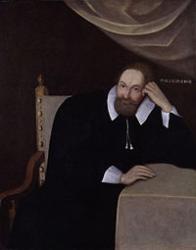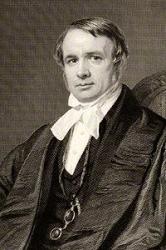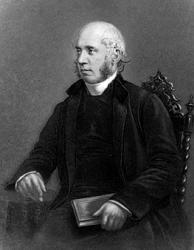Planning worship?
Check out our sister site, ZeteoSearch.org,
for 20+ additional resources related to your search.
- |
User Links
Person Results
Thomas Blacklock

1721 - 1791 Person Name: Rev. T. Blacklock Author of "Come, O my soul, in sacred lays" in Songs for the Service of Prayer Blacklock, Thomas, D.D., born at Annan, Dumfriesshire, November 10, 1721. He studied at the University of Edinburgh, and was, in 1759, licensed to preach. In 1762 he was ordained pariah minister of Kirkcudbright, but, on account of his blindness, had to resign and retire on an annuity. He went to Edinburgh and there received as boarders University students and boys attending school. In 1767 he received the degree of D.D. from the University of Aberdeen (Marischal College). He was one of the earliest and most helpful literary friends of Robert Burns. He died at Edinburgh July 7, 1791. His Poems were often printed—in 1756 at London, with a Memoir by the Rev. Joseph Spence, Professor of Poetry at Oxford; in 1793, at Edinburgh, with a Memoir by Henry Mackenzie, &c. They include 2 Psalm Versions, and 4 Hymns. "Hail, source of pleasures ever new," is altered from the Hymn to Benevolence, and "Father of all, omniscient mind," is from his version of Psalm 139. No. 16 in the Translations and Paraphrases of 1781, “In life's gay morn," &c, is also ascribed to him. [Rev. James Mearns, M.A.]
-- John Julian, Dictionary of Hymnology (1907)
Thomas Blacklock
Sir Henry Wotton

1568 - 1639 Author of "How happy is he born and taught" in Social Hymns of Brotherhood and Aspiration Wotton, Sir Henry, M.A., born in Kent in 1568, and educated at New and at Queen's Colleges, Oxford. After spending nine years on the Continent, on his return he became secretary to Robert, Earl of Essex, with whom he continued until Essex was committed for high treason, when he retired to Florence. There he became known to the Grand Duke of Tuscany, and was sent by him, in the name of "Octavio Baldi," with letters to James VI., King of Scotland, in which the king was informed of a design against his life. On succeeding to the English throne James knighted Wotton and sent him as ambassador to the Republic of Venice. In 1623 he was made Provost of Eton (having previously taken Deacon's Orders). He died in 1639. His works include The Elements of Architecture, Parallel between the Earl of Essex and the Duke of Buckingham, Essay on Education, &c. His poems and other matters found in his manuscripts were published posthumously by Izaak Walton in 1651, as Reliquiae Wottonianae. This has been several times reprinted
--John Julian, Dictionary of Hymnology (1907)
Sir Henry Wotton
Jane Cotterill
1790 - 1825 Person Name: Mrs. M. J. Cotterill Author of "O Thou, who hast at Thy command" in Songs for the Lord's House Cotterill, Jane, née Boak, daughter of Rev. John Boak, and mother of the Right Rev. Henry Cotterill, Bishop of Edinburgh; born in 1790, married 1811 to the Rev. Joseph Cotterill; died 1825. Mrs. Cotterill contributed to the Appendix to the 6th ed. of Cotterill’s Selection, 1815, the following hymns:—
1. "O! from the world's vile slavery," (For Holiness). 2. "O Thou! Who hast at Thy command," (For Resignation). These hymns were repeated in Montgomery's Christian Psalmist, 1825, and Mrs. Cotterill's name was appended thereto for the first time. Their use is not extensive. The first, "O! from the world's," &c, is found in Kennedy, 1863, No. 521, as, "From this enslaving world's control," the alterations being by Dr. Kennedy.
--John Julian, Dictionary of Hymnology (1907)
Jane Cotterill
Rabanus Maurus
Person Name: Rabanus Maurus (776-856) Author of "Come, O Creator Spirit blest" in Many Voices; or, Carmina Sanctorum, Evangelistic Edition with Tunes See Rabanus Maurus, Archbishop of Mainz, 784?-856
Rabanus Maurus
G. E. L. Cotton

1813 - 1866 Person Name: George E. L. Cotton Author of "We Thank Thee, Lord, for This Fair Earth" in The Cyber Hymnal Cotton, George Edward Lynch, D.D., born at Chester, Oct. 29, 1813, was the son of Captain Thomas Cotton, who was killed in action on Nov. 13 in the same year. He was educated at Westminster, and Trinity College, Cambridge, graduating B.A. in 1836. His first appointment was as an assistant master at Rugby. From Rugby he passed to Marlborough as Head Master in 1852. In 1858 he was consecrated Bishop of Calcutta, as successor to Dr. Daniel Wilson. He was drowned, on disembarking from a steamer at Koshtea, Oct. 6, 1866. His hymn, "We thank Thee, Lord, for this fair earth" (q.v.) is deservedly popular. [William T. Brooke]
--John Julian, Dictionary of Hymnology (1907)
G. E. L. Cotton
Robert Lowth
1710 - 1787 Author of "As pants the wearied hart for cooling springs" in Sacred Songs for School Use Robert Lowth was born in 1710, in Winchester. He was educated at Winchester School, and at New College, Oxford; Professor of Poetry in the Univesity of Oxford in 1741; Prebend of Durham, 1755; Bishop of S. David's, 1766; translated to Oxford the same year, and to London, 1777; declined the Archbishopric of Canterbury, 1783. He died in 1787.
--Annotations of the Hymnal, Charles Hutchins, M.A. 1872.
Robert Lowth
Gurdon Robins
1813 - 1883 Person Name: G. Robins Author of "There is a land mine eye hath seen" in Hymn and Tune Book Robins, Gurdon, an American bookseller, was born at Hartford, Connecticut, Nov. 7, 1813. Two of his hymns appeared anonymously in The Psalmist (Boston, 1843): (1) "There is a land mine eye hath seen" (Heaven); (2) "When thickly beat the storms of life" (God a Rock).
--John Julian, Dictionary of Hymnology, Appendix, Part II (1907)
Gurdon Robins
John Armstrong

1813 - 1856 Author of "O Thou Who Makest Souls to Shine" in Church Hymnal, Mennonite Armstrong, John, D.D., eldest son of Dr. Armstrong, a physician, was born at Wearmouth, Aug. 22, 1813, and educated at Charterhouse, and Lincoln College, Oxford, B.A. 1836. Taking Holy Orders in 1837, he was Curate of Alford, 1837; Priest-vicar of Exeter Cathedral, 1841; Rector of St. Paul's, Exeter, 1843; Vicar of Tidenham, 1845; and Bishop of Grahamstown, 1853. He died May 16, 1856. His Memoirs, by T. T. Carter, were published in 1857. He published The Pastor in his Closet, in 1847. In it appeared his hymn "O Thou Who makest souls to shine," (Ember Days) in 3 stanzas of 8 lines. It is given in the Society for Promoting Christian Knowledge Church Hymns, 1871; Thring's Collection, 1882, &c.
--John Julian, Dictionary of Hymnology, Appendix, Part II (1907)
John Armstrong
Jean Frederic Oberlin
1740 - 1826 Person Name: John F. Oberlin Author of "O Lord, Thy heavenly grace impart" in Songs for the Lord's House
Jean Frederic Oberlin
W. Spencer Walton
1850 - 1906 Author of "Oh, touch my eyes, that I may see" in The Coronation Hymnal
W. Spencer Walton


 My Starred Hymns
My Starred Hymns


